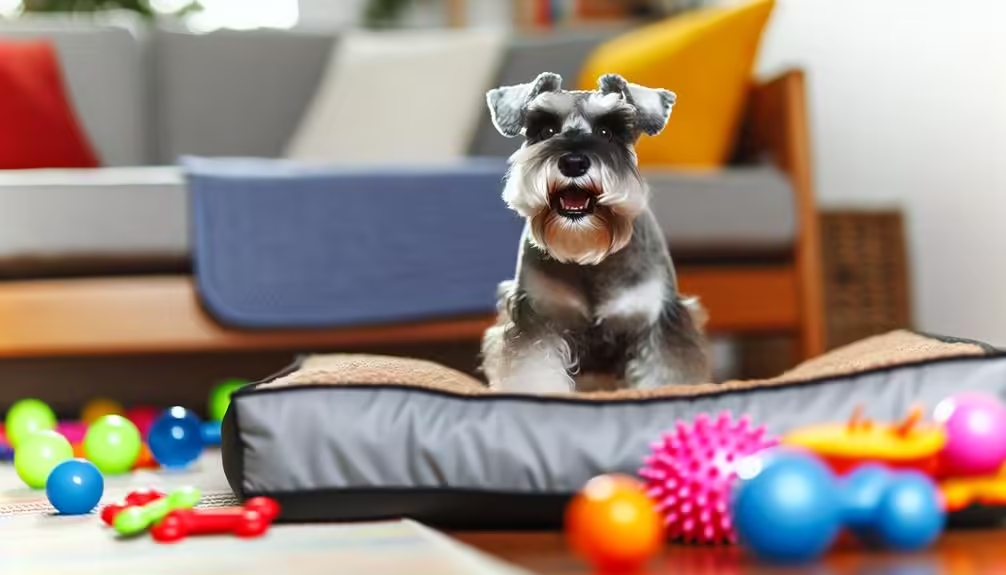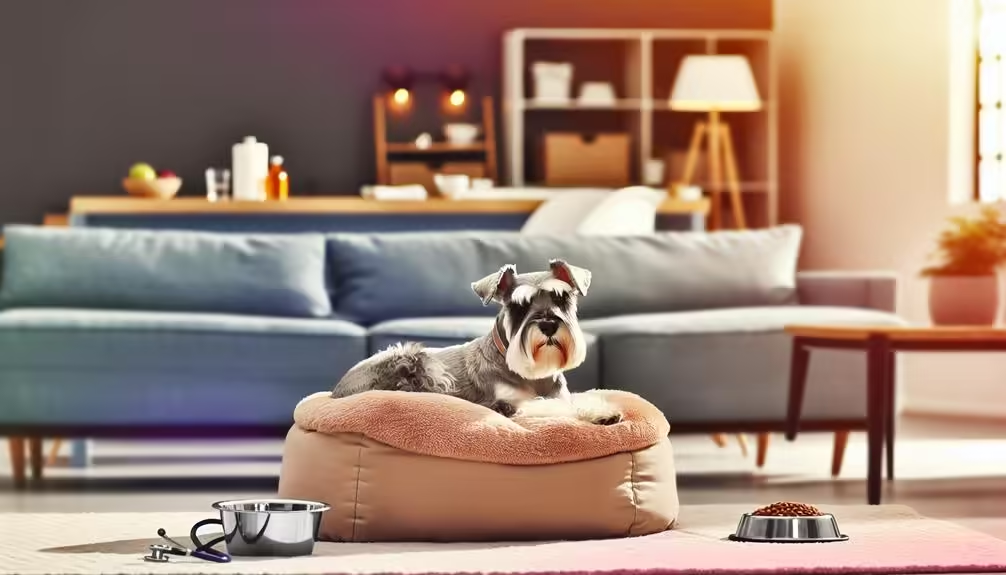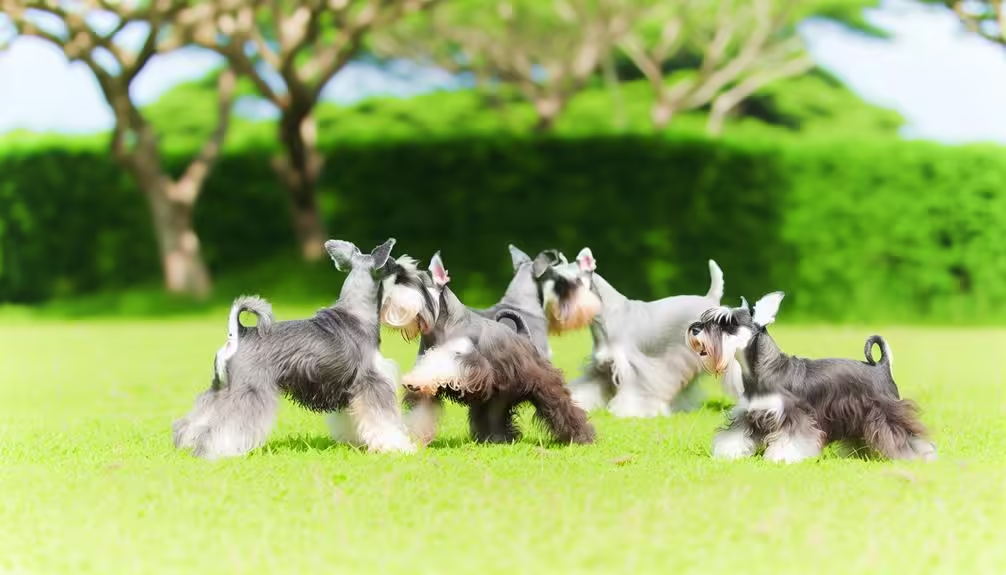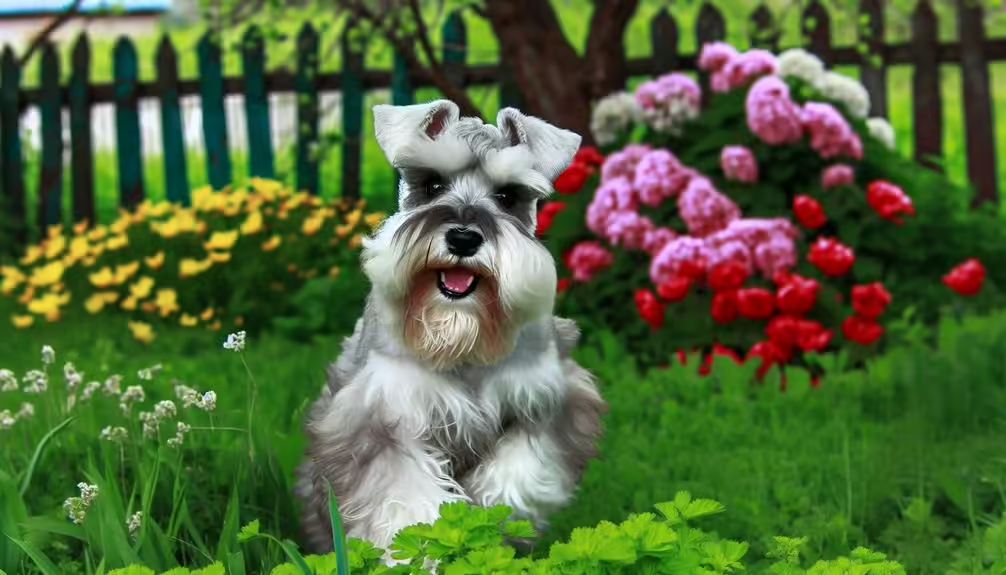Toy Schnauzers, derived from Miniature Schnauzers through selective breeding, weigh 8-12 pounds and have hypoallergenic coats in various colors.
They possess a loyal, intelligent, and playful temperament, making them ideal for urban living.
Regular grooming is essential, along with moderate daily exercise like walks and agility play.
They respond well to positive reinforcement training and early socialization.
Common health concerns include pancreatitis and hip dysplasia, so routine vet check-ups are vital.
Proper nutrition involves high-quality food tailored for small breeds.
Discover the unique care needs and benefits of owning a Toy Schnauzer as you explore further.
Jump to a Specific Section
Key Takeaways
- Toy schnauzers are small dogs, typically weighing 8-12 pounds, ideal for urban living.
- They have a hypoallergenic, non-shedding coat, making them suitable for families with allergies.
- Known for their loyalty and intelligence, toy schnauzers make excellent family pets and watchdogs.
- Regular grooming and consistent veterinary check-ups are essential to maintain their health and well-being.
- Socialization and obedience training from an early age help develop well-rounded, adaptable dogs.
History and Origin

Toy schnauzers, a diminutive variation of the miniature schnauzer, were developed through selective breeding of smaller dogs from the miniature schnauzer lineage.
This process of selectively breeding smaller individuals within the miniature schnauzer breed aimed to create a compact yet equally intelligent and loyal companion.
Originating in Germany, the miniature schnauzer itself descends from the standard schnauzer, a breed known for its versatility as a working dog and loyal companion.
By focusing on size reduction through selective breeding, breeders managed to uphold the core attributes of the schnauzer lineage while producing a smaller size variation.
This methodical approach ensured that toy schnauzers maintained the same intelligence, affectionate nature, and loyalty characteristics of their larger counterparts.
The smaller size variation has proven to be particularly advantageous for those living in urban environments or smaller spaces, making toy schnauzers ideal companions.
Their journey from Germany to becoming beloved pets worldwide underscores the effectiveness of selective breeding in achieving desired traits without compromising on the breed’s inherent qualities.
As ideal companions, toy schnauzers have quickly gained popularity among dog enthusiasts, offering a perfect blend of compact size and endearing personality.
Physical Characteristics
Maintaining the intelligence and affectionate nature of their miniature schnauzer lineage, these compact companions exhibit a range of distinctive physical characteristics that enhance their appeal.
Toy schnauzers, with their small size, typically mature to a manageable 8-12 pounds, making them ideal for various living environments.
Their hypoallergenic and non-shedding coats are particularly beneficial for families with allergies, ensuring a pleasant living experience.
The coat colors of toy schnauzers are diverse and enchanting, featuring variations such as liver, salt & pepper, black, and white.
These dogs also boast a unique array of eye colors, ranging from gold and green to hazel and blue, further adding to their distinctive appearance.
Regular grooming is essential to maintain their coat’s pristine condition, keeping them looking their best.
Below is a table summarizing key physical characteristics:
| Feature | Details | Benefit |
|---|---|---|
| Size | 8-12 pounds | Manageable for various environments |
| Coat Colors | Liver, Salt & Pepper, Black, White | Visual appeal |
| Eye Colors | Gold, Green, Hazel, Blue | Unique appearance |
| Hypoallergenic | Non-shedding coat | Suitable for families with allergies |
These characteristics make toy schnauzers not just aesthetically pleasing but also practical companions for a wide range of households.
Temperament and Personality

With their friendly, loving, and affectionate temperament, toy schnauzers excel as excellent family pets, easily forming strong bonds with their owners.
Their temperament is characterized by a blend of loyalty and devotion, making them highly dependable companions.
Miniature schnauzers, a close relative, share many of these traits, but toy schnauzers are particularly noted for their compact size and big personalities.
Their temperament is often described as spunky and playful, which means they bring a lot of energy into any household.
Despite their small stature, toy schnauzers have a resilient and adaptable personality, allowing them to thrive in various living situations, including apartments.
This adaptability is largely due to their strong desire for human interaction and attention.
Toy schnauzers are also known for their intelligence and keen to please, which enhances their affectionate nature.
This makes them not only affectionate but also reliable watchdogs.
Additionally, their personality traits make them suitable for activities like obedience training and agility courses, where their intelligence and energy are well-utilized.
Toy schnauzers are a multifaceted breed, combining affection, loyalty, and a lively temperament.
Training Tips
Effective training for toy schnauzers hinges on leveraging their high intelligence and responsiveness to positive reinforcement techniques.
Start by establishing a consistent training routine that incorporates short, engaging sessions.
Toy schnauzers excel with positive reinforcement, so use treats, praise, and playtime as rewards.
This approach not only reinforces desired behaviors but also strengthens your bond with your pet.
Socialization is another critical aspect of training toy schnauzers.
This will help them develop well-rounded social skills and reduce the likelihood of anxiety or aggression in unfamiliar situations.
To keep your toy schnauzer mentally stimulated, incorporate a variety of tasks and tricks into their training regimen.
Their keen intelligence means they enjoy learning new commands and solving puzzles, which can prevent boredom and behavioral issues.
Obedience training and agility courses are excellent ways to provide both physical and mental stimulation.
Exercise Needs

To maintain your toy schnauzer’s health and happiness, provide daily walks or play sessions tailored to their moderate exercise needs.
These small yet active dogs benefit from consistent physical activity coupled with mental stimulation to prevent boredom and maintain their well-being.
Toy schnauzers, due to their small size, are highly adaptable and can meet their exercise requirements through a combination of outdoor and indoor play.
Engaging in activities such as fetch, agility training, or interactive games not only satisfies their physical needs but also stimulates their sharp minds.
| Activity | Benefits |
|---|---|
| Daily Walks | Cardiovascular health, social interaction |
| Fetch | Physical exercise, mental engagement |
| Agility Training | Enhances agility, mental stimulation |
| Puzzle Toys | Mental sharpness, boredom prevention |
| Indoor Play | Convenient exercise, suitable for small spaces |
Tailor the exercise routine to the individual toy schnauzer’s energy level and age.
Younger, more energetic dogs may require more vigorous activities, while older dogs might benefit from gentler, low-impact exercises.
This balanced approach helps your toy schnauzer remain active and fit, promoting a long, healthy life.
Remember, every toy schnauzer is unique, so adjust their exercise schedule as needed to cater to their specific needs.
Grooming Requirements
Regular grooming is essential to maintain the health and appearance of toy schnauzers, preventing matting and tangles in their low-shedding coat.
To guarantee ideal coat maintenance, you should brush their wiry coat at least twice a week.
This routine helps remove loose hair, reduces the risk of skin issues, and keeps their fur looking neat.
In addition to brushing, regular grooming sessions should include trimming the hair around their eyes, ears, and paws.
This practice enhances cleanliness and neatness, mitigating any discomfort or vision obstruction.
Regular nail trimming is vital, as overgrown nails can lead to posture problems and pain.
Ear cleaning helps prevent infections, a common issue in breeds with folded ears.
Occasional baths are also recommended to keep your toy schnauzer clean and fresh.
Use a mild dog shampoo to avoid skin irritation and ensure thorough rinsing to remove all residue.
Proper grooming not only improves their appearance but also offers significant health benefits.
Regular grooming activities allow you to check for any abnormalities, such as lumps or skin infections, ensuring early detection and treatment.
Adopting a consistent grooming routine promotes the overall well-being of toy schnauzers.
Health Concerns

Maintaining a consistent grooming routine is important, but it’s equally significant to be aware of the health concerns that toy schnauzers may face.
Common issues include pancreatitis, liver shunts, bladder stones, hip dysplasia, allergies, and skin sensitivities.
Regular grooming can help mitigate skin allergies and sensitivities, emphasizing the need for a thorough care regimen.
Identifying health concerns early on is essential for effective management.
Genetic testing plays a crucial role in detecting predispositions to certain conditions, allowing you to take proactive measures.
For instance, knowing your toy schnauzer’s genetic risk for liver shunts or hip dysplasia can help you tailor their care and avoid potential complications.
Routine veterinary check-ups are indispensable in monitoring your dog’s overall health.
These visits ensure that any emerging issues are promptly addressed, and they provide an opportunity for professional advice on maintaining optimal health.
Additionally, a proper diet and regular exercise are critical components in preventing obesity-related conditions like pancreatitis and bladder stones.
Educating yourself about toy schnauzer health concerns empowers you to provide the best care possible, ensuring your furry companion leads a long and happy life.
Feeding Guidelines
When feeding your toy schnauzer, it is important to provide high-quality dog food specifically formulated for small breeds to guarantee they receive the appropriate nutrients.
Toy schnauzers have distinct nutritional needs that differ from larger breeds, necessitating a diet rich in protein, healthy fats, and essential vitamins.
Adhere to strict feeding guidelines to make sure your toy schnauzer maintains peak health.
Typically, feeding schedules should consist of 2-4 small meals per day.
This practice helps prevent hypoglycemia, a condition toy schnauzers are particularly susceptible to.
Portion control is crucial in managing their weight, as toy schnauzers are prone to obesity.
Overfeeding can lead to various health issues, including joint problems and diabetes.
Select dog food that specifies it meets the nutritional needs of small breeds, ensuring it includes balanced proportions of carbohydrates, proteins, and fats.
Additionally, limit treats and opt for healthy options to avoid unnecessary calorie intake.
Always consult with your veterinarian to tailor feeding guidelines specific to your toy schnauzer’s age, weight, and activity level.
This personalized approach ensures your pet’s dietary regimen supports their overall well-being and longevity.
Socialization Techniques

Effective socialization techniques for toy schnauzers involve exposing them to diverse environments, people, and animals from a young age to foster confidence and adaptability.
Begin by introducing your toy schnauzer to various settings such as parks, busy streets, and different homes.
This exposure aids in building their resilience and reducing the likelihood of behavioral issues like fearfulness and aggression.
Important interactions are essential.
Engage your toy schnauzer in regular outings, playdates with other dogs, and training classes.
Reward-based training methods, such as treats and praise, reinforce good behavior and encourage a positive association with new experiences.
Early socialization is key to preventing anxiety and ensuring a well-adjusted pet.
| Activity Type | Socialization Benefits |
|---|---|
| Regular Outings | Builds resilience and confidence |
| Playdates | Encourages friendly behavior |
| Training Classes | Enhances adaptability |
Ideal Living Conditions
While ongoing socialization is important for your toy schnauzer’s development, understanding their ideal living conditions guarantees they remain happy and healthy in your home.
Toy schnauzers excel in apartment living due to their compact size and moderate energy levels.
They are well-suited for urban environments and adapt seamlessly to small living spaces. Despite limited outdoor areas, they thrive with sufficient indoor playtime.
In urban environments, toy schnauzers don’t require extensive outdoor space.
Regular short walks and mental stimulation keep them engaged and content.
These dogs find joy in interactive toys and puzzles, making indoor playtime integral to their well-being.
Their adaptability to various climates ensures they remain comfortable regardless of seasonal changes.
For owners in small living spaces, toy schnauzers are ideal companions.
Their preference for curling up on a lap or a cozy bed complements a compact home setting.
Maintaining a routine of daily exercise and mental challenges ensures they remain physically and mentally stimulated.
By understanding these core requirements, you’ll create an environment where your toy schnauzer can thrive, providing them with a fulfilling and balanced life.
Frequently Asked Questions
Is There a Toy Size Schnauzer?
Yes, there is a toy-size schnauzer. This smaller version of the standard schnauzer retains the breed’s intelligence, affectionate nature, and hypoallergenic coat, making it ideal for families in apartments or smaller homes.
What are the distinctions between a Mini Schnauzer and a Toy Schnauzer?
A mini schnauzer typically weighs 13-17 pounds, while a toy schnauzer weighs 8-12 pounds. The toy variant has a more compact body and shorter legs. Both share traits like intelligence, affectionate nature, and non-shedding coats.
Do Toy Schnauzers Bark a Lot?
Imagine a vigilant sentinel. Toy Schnauzers, like this sentinel, are naturally alert and vocal. They tend to bark frequently, but consistent training, mental stimulation, and socialization can effectively manage and reduce excessive barking behaviors.
Are Toy Schnauzers Good Dogs?
You’ll find that Toy Schnauzers are excellent dogs due to their intelligence, affectionate nature, and adaptability. They excel in obedience training, are hypoallergenic, and thrive in various living environments, making them ideal family pets.
Conclusion
Bringing a toy schnauzer into your home means gaining a devoted, intelligent companion who thrives on human interaction.
Imagine Sarah, who found her toy schnauzer, Max, to be an exceptional agility competitor and a comforting therapy dog for her elderly mother.
Max’s versatility and affectionate nature are typical of the breed.
With proper training, exercise, and socialization, you’ll find your toy schnauzer to be a well-rounded, loyal friend, enhancing your family’s life in countless ways.
